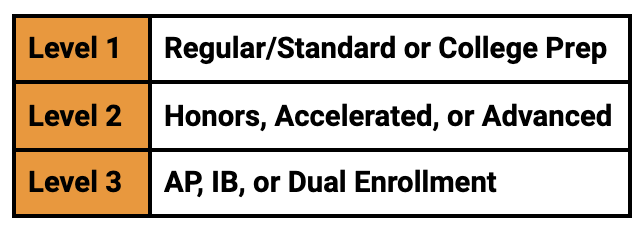“Academic rigor” refers to academic experiences (course content, homework, exams, essays) that are intellectually challenging.
A rigorous environment does not necessarily mean monstrous homework assignments and hours-long exams—it means that students are expected to achieve a high academic standard by demonstrating critical thinking, problem-solving, and practical application of concepts.
How do colleges measure rigor?
True rigor is difficult to measure across the variety of high school curriculums taught in the US, let alone internationally. So most colleges and universities use course designations, such as Honors or AP, as a shorthand. The idea is that the more courses you take with an Honors or AP (or similar) designation, the higher your rigor.
At US high schools, the most commonly used levels of rigor look something like this:
This is an approximation and excludes several less-common course designations that your school may use. It’s also possible that your school doesn’t use any designations at all, and that’s okay.
How do I know my rigor will be evaluated fairly?
You don’t, really. The college admission process is inherently imperfect and subjective. BUT, colleges do employ strategies to help them evaluate rigor as fairly as possible and they recognize that context matters.
When you apply to college, your high school is required to submit a school profile along with your transcript and recommendation letters. The school profile tells the admission office what types of academically challenging opportunities are offered at your school and whether there are limits to the number of rigorous courses students can take. This ensures that an applicant whose school offers only 2 AP classes will not be directly compared with an applicant whose school offers 20.
Take, for example, the following real high schools:
EXAMPLE 1:
This first example is a private school located in a major US city. They offer 13 Honors, 19 AP, and even 7 post-AP “Advanced Topics” classes.
EXAMPLE 2:
This second example is a public school located in a rural community in the US. They only offer 3 Honors classes (all in English) and no AP or other advanced classes, though they do offer Dual Enrollment through a state university.
Students applying to the same college from each of these high schools are reviewed within the context of their school—the student from the rural high school would be expected to have no more than 3 Honors courses plus some Dual Enrollment courses, while the student from the urban high school would be expected to have many Honors and AP courses across multiple subjects, but no Dual Enrollment.
So, I should take as many rigorous courses as my school will allow, right?
Not necessarily. Every student is different, so it’s important to find a balance. If you can take the most rigorous curriculum your school offers while maintaining good grades (and your sanity), then definitely go for it. But if increasing your rigor is likely to overwhelm you and cause your grades to drop, make sure you take a strategic approach. (Read Marjorie’s blog post where she answers the question: Is It Better to Get an A in a Regular Course or a B in an AP Course?)
Seek out classes that are appropriately challenging for you. If you struggle with math or are constantly confused by foreign languages, it doesn’t make sense to seek extra rigor in those subjects. But maybe you have an aptitude for biology or love synthesizing historical texts—that’s where you should increase your rigor. Play to your strengths and focus on challenging yourself in subject areas that you enjoy.
Our College Advisors can help you recognize and cultivate your academic strengths and interests, develop an appropriately rigorous curriculum, and put your best foot forward when it comes time to apply to college.
Want to learn more about rigor and holistic admissions? Check out this blog by LogicPrep College Advisor and former Stanford admission officer, Grace: 5 Things I Didn’t Know Before Working in Undergraduate Admissions. And, as always, feel free to reach out with any questions you have about how to maximize your college application!





